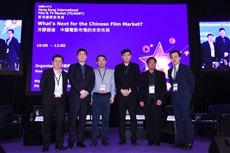FILMART Seminar: Positive Adjustment Of Chinese Film Market
14 March 2017 – The 21st edition of the Hong Kong International Film and TV Market (FILMART) is underway at the Hong Kong Convention and Exhibition Centre until 16 March. A premier trading platform for the international entertainment industry, this year’s FILMART welcomes more than 800 exhibitors from 35 countries and regions. A series of thematic seminars led by global industry leaders are being held during FILMART.
Yesterday’s conference, “What’s Next for the Chinese Film Market”, shed light on the industry’s future prospects. The conference moderator Jiang Shengyang, Presenter at Phoenix TV, quoted statistics highlighting that the Chinese mainland has surpassed Japan to become the world’s second-largest film market after the United States. However, the mainland’s box office receipts grew just 3.4 per cent year-on-year in 2016, in contrast to the double-digit growth of previous years. Mr Jiang posed the key question: “Is this a positive adjustment or a challenge for mainland Chinese film practitioners?”
Positive adjustment focusses on enhancing quality of films
Qing Hong, Chairman of J.Q. Picture Holdings Ltd, which will release 10 films between 2017 and 2019, pointed out that the mainland’s box office grew from approximately Rmb900 million in 2004 to Rmb40 billion in 2016. In this context, it is normal for the industry to enter a period of positive adjustment. He emphasised that the mainland film industry should make serious efforts to enhance the quality of Chinese films; in particular, it should avoid producing unsophisticated content.
Jiang Defu, General Manager of Wanda Media Co. Ltd, which is investing in more than 60 film projects over the next three years, agreed. He stated that beyond the accelerated growth of the mainland’s box office, adjustments are needed in film production management and the mindset of film practitioners amidst the industry’s rapid development. He said, “The market has not shrunk and the audience is still growing. It is not growing at a double-digit rate as it was before, though this also presents an opening for industry peers to search for new paths.”
Daniel Chan, CEO of Fu Jian HenYe Pictures Co., Ltd. which has distributed more than 80 films, noted that both the market and the audience have reached a higher level of maturity after more than decade of development, and only high-quality films attract large audiences to go to the cinema.
Stanley Tong, Producer and Director/General Manager of China Film International Media Co. Ltd., remarked that China-foreign film co-productions have positive impact on the development of China’s film industry. In particular, technological advances help to expand the room for imagination for directors, and enable them to produce films on a larger scale. However, he also noted that younger mainland audiences like to watch films online on pay-per-view, which has certainly impacted box office receipts. He also cited statistics showing that second and third tier cities contribute to about 70 per cent of the mainland box office revenue, while most cinema-goers are female. “In the mainland, cinema-goers usually attend in pairs, a man and a woman or two women, but rarely two men. Therefore, the subjects of the films should (also) cater to the taste of the female audience.”
Pay-per-view films to create boundless opportunities
Chao Yin, CEO of Beijing Tmeng Network Technology Co., Ltd believed that as electronic payment matures in the mainland, watching films online on pay-per-view has become a new trend among young people. He stated that with pay-per-view films, the user is charged Rmb5 only after they have watched the film for six minutes. Last year this generated Rmb1.5 billion in revenue, which is the equivalent to the mainland’s total box office receipts in 2004. However, there are close to 500 million online video channel users, with each user having an average of two accounts. If each account has an estimated spend of Rmb200 per year, it would amount to a Rmb20 billion market. He said, “The subjects of online films should cater to the taste of online audiences, as the content should be innovative and interesting. Online productions also offer a new platform for young creative talents.”
Mr Chao also remarked that online pay-per-view films are creating new business opportunities. “In the past it involved only the sale of copyright. Some years ago City of Life and Death was sold to Sohu for Rmb600,000. Last year, Line Walker was sold for Rmb40 million, which was a relatively low price given its Rmb600 million box office gross.” He mentioned that while the number of online video channels is increasing, it also drives up tariffs for film copyright. Meanwhile, audiences of online video dramas also have high expectations for content and quality. The challenge is how to instill the essence of film into online video dramas, since adapting high-grossing films into online video dramas is no guarantee for success.
Mr Jiang added that the Internet opens up a new path for small-budget films, especially when there are limited slots for theatrical releases in local theatres. “Outstanding alternative films may find their room for survival on the Internet,” he said. He also advises film practitioners to keep abreast of the trends. “Some filmmakers may take their time to make a film, where it takes up to a few years from planning to completion. But the trends are constantly changing. In a few years’ time, the audience’s taste may have changed.”
Incentive for innovative marketing
Mr Jiang added that the Internet is an excellent marketing platform. “In the past, actors or actresses had to visit different cities to promote a film upon its theatrical release, but they could only travel to a few cities at most, given their tight schedules. Recently when we presented the online premiere of The Great Wall, more than 20 million people watched it live. This points to the potential for growth, and the possibilities for innovative marketing thinking.”
Speaking on China-foreign film co-productions, Mr Tong believed the mainland audiences have frequent exposure to imported foreign films and are astute film critics. Film practitioners should be diverse in their choice of subjects and make authentic Chinese films, he said. “The script should be confirmed before the director is picked. It is impractical to pick an action film director and then incorporate elements of drama into the film, or add humour to an art film. The end result will be a strange hybrid.”
Mr Jiang emphasised that film practitioners should conduct data analysis and have a clear grasp of audience’s preferences. Referring to a survey on audiences’ preferences for imported films conducted by his company, among audience members aged between 16 and 30, 25 per cent of respondents chose action films and 18 per cent preferred science fiction films. “The 16- and 17-year-old respondents will become the main film audience in the future. It is important to understand their taste.”
Filmart: http://www.hktdc.com/hkfilmart
|
|
||
|
A series of thematic seminars are being held during FILMART. One of the conferences, “What’s Next for the Chinese Film Market”, was held yesterday. From left to right: Daniel Chan, President, Fujian Hengye Pictures; Jiang Defu, General Manager, Wanda Pictures; Qin Hong, Chairman, JQ Pictures; Chao Yin, CEO, Tmeng.CN; Stanley Tong, Producer and Director / General Manager of China Film International Media Co. Ltd.; and moderator: Jiang Shengyang, Presenter, Phoenix TV. |
||
|
|
|
|
|
Stanley Tong, Producer and Director / General Manager of China Film International Media Co. Ltd. |
Jiang Defu, General Manager, Wanda Pictures |
Qin Hong, Chairman, JQ Pictures |
Media Enquiries
Please contact the HKTDC's Communication and Public Affairs Department:
Joe Kainz Tel: (852) 2584 4216 Email: joe.kainz@hktdc.org
Media Registration: Media representatives wishing to cover the event may register on-site with their business cards and/or media identification.
To view press releases in Chinese, please visit http://mediaroom.hktdc.com/tc
About the HKTDC
Established in 1966, the Hong Kong Trade Development Council (HKTDC) is a statutory body dedicated to creating opportunities for Hong Kong’s businesses. With more than 40 offices globally, including 13 on the Chinese mainland, the HKTDC promotes Hong Kong as a platform for doing business with China, Asia and the world. With 50 years of experience, the HKTDC organises international exhibitions, conferences and business missions to provide companies, particularly SMEs, with business opportunities on the mainland and in international markets, while providing information via trade publications, research reports and digital channels including the media room. For more information, please visit: www.hktdc.com/aboutus. Follow us on Google+ Twitter @hktdc LinkedIn






